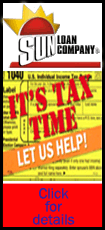|
 But sometimes the unexpected happens. But sometimes the unexpected happens.
A chief justice stumbles while administering the oath. The bitter cold forces the inaugural ceremony to move inside. A president decides to break from tradition and walk with his inauguration parade down Pennsylvania Avenue to the White House.
Here, in a look at recent presidential inaugurals, are some unexpected or otherwise memorable moments:
___
2009
Barack Obama took his place in history as the country's first black president as he was sworn in on Jan. 20, 2009. A crowd that spanned the U.S. Capitol to the Lincoln Memorial witnessed the moment
-- a record turnout of about 1.8 million people.
A briefly awkward instance during his oath-taking ceremony caught observers by surprise.
As Chief Justice John Roberts began reciting the first part of the oath, Obama started to repeat the opening line before Roberts finished. Roberts then misplaced a word in the constitutionally required oath.

Instead of saying, "... that I will faithfully execute the office of president of the United States"
-- Roberts rearranged the words a bit and said "faithfully" after "president of the United States." Obama started to respond, but abruptly stopped to let Roberts correct the mistake. Roberts started speaking again and put "faithfully" in the right place but left out the word "execute." And then Obama repeated Roberts' original, incorrect version.
The two men finished the oath with smiles, to the cheers of a jubilant crowd.
The White House maintained that Obama was president regardless of the oath flub. Even so, Roberts administered the oath again a day later, perfectly, before a small group of reporters in the White House Map Room.
___
2001
After the contested 2000 election, George W. Bush pledged at his inauguration as the 43rd president to "build a nation of justice and opportunity."
On the inaugural platform with Bush as he took the oath of office that day was his vanquished rival, outgoing Vice President Al Gore, who won the popular vote but fell short in the electoral competition when the battle for Florida ended in the U.S. Supreme Court.
Also standing near Bush during the ceremony was his father, George H.W. Bush, the nation's 41st president. After the oath, the younger Bush hugged his father, who wiped away a tear. The last time the nation had seen an incoming president's father live long enough to attend his son's inauguration was 40 years earlier, when Joseph Kennedy watched the inauguration of President John F. Kennedy in 1961.

___
1993
At his first inauguration Bill Clinton, of Hope, Ark., pressed for change and told the nation that "to renew America, we must be bold."
His inaugural ceremony featured poet Maya Angelou, who also grew up in Arkansas. She read a poem that celebrated America's diversity, one she had written for the occasion
-- "On the Pulse of Morning." Angelou was the first poet to read at a presidential inauguration since Robert Frost, who read at John F. Kennedy's swearing-in in 1961.
Later that night, the new president delighted thousands at a packed room at the Arkansas ball, where Clinton played "Your Momma Don't Dance and Your Daddy Don't Rock
'n' Roll" on his trademark saxophone with Ben E. King.
Clinton would take up the sax again and jam with Clarence Clemons, and at another ball with Herbie Hancock and Thelonius Monk.
___
[to top of second column] |
 1989
George H.W. Bush was inaugurated on the 200th anniversary of the presidency, and so one of the two Bibles on which he rested his hand during the oath was the same Bible that George Washington used in 1789. The other Bible belonged to the Bush family.
Bush opened his inaugural address with a tribute to Ronald Reagan, the man he served as vice president, calling Reagan a "man who had earned a lasting place in our hearts
-- and in our history."
The day marked the first transition in 60 years when an outgoing president had been succeeded by a member of his own party through an election. It had last happened in 1929, when Herbert Hoover succeeded Calvin Coolidge.
___
1981 and 1985:
With Jimmy Carter looking on, Ronald Reagan took the oath as the nation's 40th president on an unusually warm January day. But what happened minutes later made this Inauguration Day really different
-- Iran freed 52 American hostages it had held for 444 days.
A complicated deal worked out in the final weeks of the Carter administration eventually secured their freedom. Reagan, however, announced to the nation that the hostages were on their way home.
Reagan told congressional leaders that some 30 minutes earlier, planes bearing U.S. prisoners left Iranian airspace and "they are now free of Iran." He spoke at the traditional luncheon following the swearing-in.

Four years later, Reagan's second inaugural was remembered for a bitter cold snap. The public ceremony was moved inside, where Reagan delivered his inaugural address to invited guests in the Capitol Rotunda. The traditional parade had to be canceled because of the subfreezing temperatures.
___
1977:
Jimmy Carter wanted a people's inaugural.
So, the newly sworn-in president shunned the customary limousine ride from the Capitol down Pennsylvania Avenue during his parade on Jan. 20, 1977. The program had called for Carter to ride in the limo until the procession of marching bands, floats and others was a couple of blocks away from the executive mansion.
Instead, Carter decided to walk the mile-plus parade route.
First, he strolled hand in hand with his wife, Rosalynn. They smiled and waved to an excited
-- and surprised -- crowd.
Then, Carter was joined by his sons, Jack, Chip and Jeff. And later, near the end of the parade route, he was joined by his youngest child, 9-year-old Amy, who walked between her parents, all three holding hands.
___
Sources: The Associated Press, Presidential Inaugural Committee 2013 and Joint Congressional Committee on Inaugural Ceremonies.
[Associated
Press; By JENNIFER C. KERR]
Copyright 2013 The Associated
Press. All rights reserved. This material may not be published,
broadcast, rewritten or redistributed.
 |